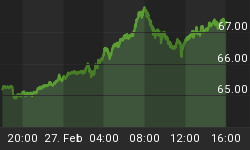You wouldn’t know that by listening to current commentary on the economy.
There is a bigger threat, though. But first, there is some clarification about inflation that is necessary.
Most people infer rising prices when they hear the term inflation. That is not correct. The rising prices are the ‘effects’ of inflation. The inflation, itself, has already been created.
It is not created, or caused, by companies raising prices. And it is not created by ‘escalating wage demand’.
When someone says, “inflation is back”, they are referring to rising prices. Yet they are wrong on two counts. First, as we have previously said, the rising prices, generally, are the effects of inflation. Second, the inflation isn’t back; because it never went away.
From my book Inflation, What It Is, What It Isn't, And Who's Responsible For It:
“Inflation is the debasement of money by the government.
There is only one cause of inflation: government. The term government also includes central banks; especially the U.S. Federal Reserve Bank.”
The United States Federal Reserve Bank has left a century-long trail of damage in its wake. A misguided attempt to manage the stages (growth, prosperity, recession, depression) of the economic cycle has led to nearly complete destruction in the value of our money. The cumulative loss in value of the U.S. dollar since inception of the Fed in 1913 amounts to more than ninety-eight percent.
The erosion in the value of the U.S. dollar is the result of inflation that has been created by the Fed via their expansion of the total supply of money and credit. The inflation created by the Fed is ongoing and intentional. So, it is difficult to not expect more of the same. But, in addition, they are now just as focused on ‘holding things together’.
The Federal Reserve caused the Depression of the 1930s and worsened its effects. Their actions also led directly to the catastrophic events we experienced in 2007-08 and have made us more vulnerable than ever before to calamitous events which will set us back decades in our economic and financial progress. Related: British Pound Soars To Highest Level Since Brexit
The new Chairman of the Federal Reserve, Jerome Powell, is personable, likable, candid, and direct. But he cannot and will not preside over any changes that will have lasting positive impact.
The Federal Reserve does not act preemptively. They are restricted by necessity to a policy of containment and reaction regarding the negative, implosive effects of their own making.
And their actions, especially including the inflation that they create, are damaging and destructive. Their purpose is not aligned with ours and never will be.
Yet they are not independent. In fact, they have a very cozy relationship with the United States Treasury. That relationship is the reason they are allowed to continue to fail in their attempt to manage the economic cycle.
There are two specific terms which describe our own actions and relationship with the Federal Reserve – obsession and dependency.
We are bombarded daily with commentary and analysis regarding the Fed and their actions. Almost daily we are treated to rehashing of the same topics – interest rates, inflation – over and over. And we seemingly can’t read or hear enough, i.e. obsession.
But are we reading or hearing anything which will help us gain a better understanding about the Federal Reserve? And what, if anything, can we realistically expect them to do?
We are also hooked on the liberally provided drug of cheap credit. Our entire economy functions on credit. We are dependent on it. And without huge amounts of cheap credit, our financial and economic activity would come to a screeching halt.
A credit implosion and a corresponding collapse of stock, bond and real estate markets would lead directly to deflation. The incredible slowdown in economic activity leads to severe effects which we refer to as a depression.
Deflation is the exact opposite of inflation. It is the Fed’s biggest fear. And it is a bigger threat at this time than progressively more severe effects of inflation.
The U.S. Treasury is dependent on the Federal Reserve to issue an ongoing supply of Treasury Bonds in order to fund its (the U.S. government’s) operations. During a deflation, the U.S. dollar undergoes an increase in its purchasing power, but there are fewer dollars in circulation.
The environment during deflation and depression makes it difficult for continued issuance of U.S. Treasury debt, especially in such large amounts as currently. Hence, the resulting lack of available funds for the government can lead to a loss of control.
The U.S. government is just as dependent on debt as our society at large.
Related: Markets Bounce Back As Geopolitical Fears Subside
The following excerpt is from my new book All Hail The Fed
“When something finally does happen, the effects will be horribly worse. And avoidance of short-term pain will not be an option. The overwhelming cataclysm will leave us no choice.
As severe as the effects will be because of previous avoidance and suppression, they will also last longer because of government action. The cry for leaders to “do something” will be loud and strong. And those in authority will oblige.
But don’t look to the Federal Reserve for a resolution. They are the cause of the problem.”
By Kelsey Williams via Kelsey's Gold Facts
More Top Reads From Safehaven.com:
















